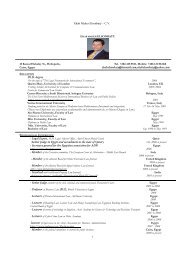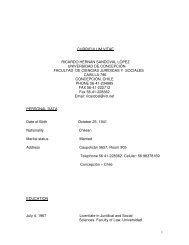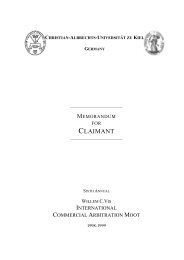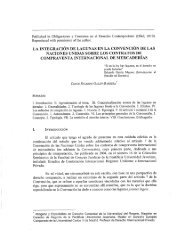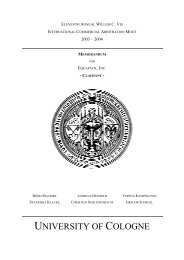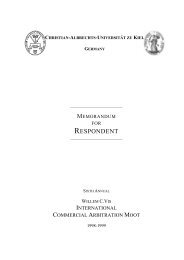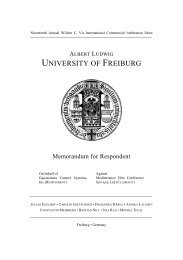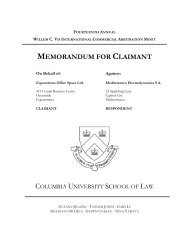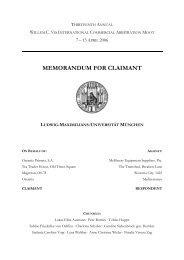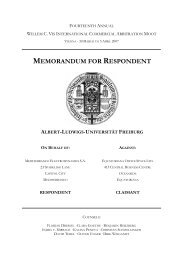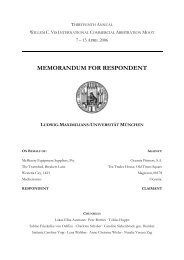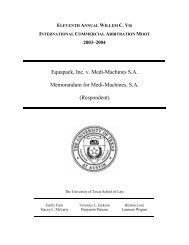MEMORANDUM FOR RESPONDENT - Pace University
MEMORANDUM FOR RESPONDENT - Pace University
MEMORANDUM FOR RESPONDENT - Pace University
Create successful ePaper yourself
Turn your PDF publications into a flip-book with our unique Google optimized e-Paper software.
QUEEN’S UNIVERSITY FACULTY OF LAW<br />
result, Claimant knew or could not have been unaware that the Contract did not contain a size<br />
requirement. Claimant declined to object to this description of the goods. Consequently,<br />
Claimant became bound by Respondent’s intent that the squid be unsized.<br />
B. A reasonable person in Claimant’s position would have understood that<br />
Respondent intended to sell unsized squid.<br />
64. Should the Tribunal find that Claimant was not aware of Respondent’s intention to deliver<br />
unsized squid, an objective interpretation of the Contract under art. 8(2) CISG yields the same<br />
result. Respondent’s intention should prevail if it would have been understood by a reasonable<br />
business person in the same industry and position as Claimant [Farnsworth in Bianca/Bonell 98;<br />
Schmidt-Kessel in Schlechtriem/Schwenzer 2005 119-121; LG Feb 1996].<br />
65. A reasonable interpretation of the Parties’ negotiations indicates agreement that the Squid were<br />
to be unsized. In its 29 May 2008 Sale Confirmation, Respondent indicated that the Squid would<br />
come from the “2007/2008 Catch” [Cl. Ex. 4]. As indicated above [see supra 63], this meant that<br />
the catch would include younger, smaller squid caught early in the 2008 season. Claimant is an<br />
experienced participant in the fisheries trade [St. of Def. 16; Clar. 27]. In the face of<br />
Respondent’s stated intent to supply squid caught early in the 2008 season, a reasonable business<br />
person in Claimant’s position would understand that the Contract was for unsized squid.<br />
66. Furthermore, there are no weight requirements in either the Order Form or Sale Confirmation<br />
[Cl. Ex. 3; Cl. Ex. 4]. The CISG does not preclude extrinsic information from becoming a term<br />
of the Contract; however, a reasonable and experienced purchaser in the fishing industry would<br />
indicate the basic requirements of the fish it wanted in its order—including size. It is<br />
unreasonable to bind the Parties to a requirement that is not found in either the Order Form or<br />
the Sale Confirmation. Accordingly, the Tribunal should find that a reasonable business person<br />
in Claimant’s position would understand the Contract was for unsized squid.<br />
II. THE SQUID WERE FIT <strong>FOR</strong> THE PURPOSES <strong>FOR</strong> WHICH GOODS OF THE SAME<br />
DESCRIPTION WOULD ORDINARILY BE USED.<br />
67. Claimant alleges that the Squid could not be used as bait and therefore were not “fit for the<br />
purposes for which [squid] of the same description would ordinarily be used” [Cl. Memo. 37; art.<br />
35(2)(a) CISG]. This argument must fail. The ordinary use for squid as described in the Contract<br />
is human consumption [Cl. Ex. 3; Cl. Ex. 4], and the squid were fit for this purpose [Cl. Ex. 8].<br />
68. The goods must meet the reasonable expectations in the industry for goods of that description<br />
[Schwenzer in Schlechtriem/Schwenzer 2005 417; Rijn Blend Case (Netherlands 2002)]. While the goods<br />
must be fit for all purposes for which goods of the same description are ordinarily used [Henschel<br />
2005 194; Sec. Comm. art. 35], the scope of the ordinary purposes is limited by the description of<br />
20



